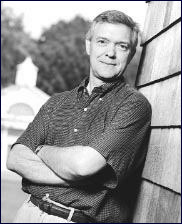|
|
Director of
Banbury Center at Cold Spring Harbor Laboratory
http://www.cshl.edu:80/public/SCIENCE/witkowski.html
"Communication
is absolutely a key element in science," says Jan Witkowski.
It’s his job to make sure that scientists around the world
can keep talking with each other and exchanging ideas through meetings
and publications produced by Cold Spring Harbor. As director of
the laboratory’s Banbury Center, Witkowski organizes about
twenty meetings a year. "Our meetings are extremely international,"
he says. "The world comes to Cold Spring Harbor."
With a background in zoology and biochemistry, Witkowski went to
many meetings himself before taking on the job of coordinating them,
so he knows firsthand their importance. And he’s had to endure
the inevitable scrutiny of others at what are known as "poster
sessions," where a researcher creates a poster of his or her
work, puts it on display at a meeting, and is available for discussion
about it. "I used to get terribly embarrassed standing next
to my poster, on the one hand not wanting to be there alone, but
on the other not being terribly keen on having to defend what I’ve
got against an onslaught from other people."
That onslaught, though, is useful, Witkowski says, and a necessary
part of science. Because DNA is common to all living things, genome
scientists studying very different organisms can often talk quite
easily about each other’s work. "What the plant molecular
geneticist and the animal molecular geneticist have in common is
DNA," says Witkowski. "DNA has provided a common language
for people working on genetics of whatever organism to talk to each
other. So you can communicate very easily."
|
|

|

|

"The
DNA double helix itself is an icon of science, the way the Bohr
atom was the icon of science in the '50s and '60s. It’s
the one discovery of the twentieth century that’s really
impressed itself on the public."
|

|

|

|

.
get
free real player
get
help
|
|

